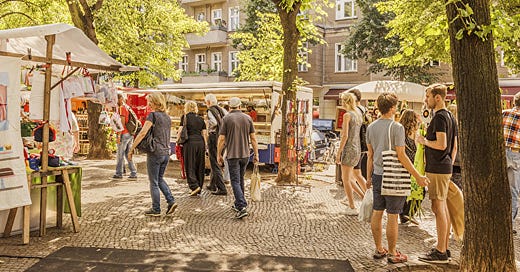Last Saturday was my favourite kind of Saturday. I woke up not hungover. I went to a 10am spin. I showered, and headed to the market. I ordered a flat white, bought some salsiccia from the Wurst man (not his real name), and sat in the sun at Boxhagener Platz with a podcast on Richard Curtis.
Bliss.
Later, I cooked a delicious sausage and fennel ragu and had some old-ish friends over for dinner. Bliss again.
If you recognise this Saturday, it may be because your perfect Saturday might look a lot like my perfect Saturday. In fact, so similair are the Saturdays of other late 20s city-dwellers that upon texting various group chats late on Saturday morning, most of my friends/sisters were also on the way back from markets - in north, south and west London alike. Berlin may have its quirks, but the middle-class are universally consistent.
In earlier years, I may have found this disheartening. I always wanted to be doing something adventurous. To be in some way different. Often this brought with it great things: choosing to play the saxophone when I was 8 (“I don’t want to play the clarinet, violin or flute. I want to be different.”), moving to Lisbon during the pandemic, and after, immediately moving to Berlin*. *Note that this was 6 weeks before Brexit and in the middle of a global pandemic, when I (quite literally) could not come back.
But as I get older, I am starting to find I’m increasingly comforted by the universality of it all. By how - to put it bluntly - average I am.
On exceptionalism
One of the smartest things my older sister bangs on about is the myth of exceptionalism. Turns out 28 years of being an eldest sister combined with 3 years of psychology training has brought with it quite a lot of wisdom.
What she means by this (I think) - is that all of us are very special but also not special at all, despite what Linkedin/other social media might suggest. Constantly looking for something that marks you as ‘exceptional’ or in my case, adventurous, or ‘different’ is dangerous because it can push you to keep working and/or moving and/or anything until you feel that special feeling you’ve been looking for.
This realisation has some big implications that go far beyond accepting the fact that my perfect Saturday looks a lot like everyone else’s. When I really accept this idea, it helps me to accept the fact that there will always be someone smarter / funnier / prettier / richer / anything-er than me. And that’s pretty much true of everyone.
More than anything, it helps me be kinder to myself - to forgive the laziness, the mistakes at work, the job rejections. It takes off a competitive edge that drove me as a teenager and into my early 20s. It’s as if the understanding that I am - almost by definition - average, takes some of the pressure off my shoulders that I put on myself without realising.
On relationships
In a great article in the Guardian in February, Moya Sarner wrote
There is a disturbing vulnerability that comes with an unconscious wish to feel special. It means you can easily be drawn into relationships built on sand – falling in love not with the other person, with who they are, but with yourself through their eyes.
This idea hit me hard. If I reflect back on my dating life in my early 20s, I think I often did tend towards men who in someway made me feel ‘special’.
There were the tech-start-up founder types (the nerdy, Mark Z style - hoodies in summer, obsessed with crypto, always slightly distracted). They were exceptionally smart, often exceptionally poor communicators, and somehow made me feel… intelligent by osmosis.
Then there were the South American men I met during travel or in expat-y Berlin circles - men who made me feel worldly by association. I think they offered some kind of imagined escape route from the mundaneness of my background (that only I myself perceived).
If I look back honestly, so many of the men I dated in my early 20s fed into a hope/dream that I was destined to be in some way different from the girls back at home who stayed in London.
It’s not that any of these experiences were bad - quite the opposite in fact - but they were built on projection, not connection. I wasn’t really falling for them. I was falling for how I thought others might perceive me when I was with them.
Now, thanks to the joyful experience of moving through your 20s and increasingly accepting - and loving - your ordinariness - I don’t do this anymore. I’ve got the best partner in the world (why? he’s on his way home with a kebab right this moment) - and although I feel like our relationship is anything but ordinary (I don’t think it’s normal to love someone this much), I know that in the best ways, it is.
Even more alarmingly for my younger self is that soon(ish), we’ll move together back to London to try the very ordinary life I was trying to get away from.
—
It’s not to say that I don’t still like the thought of throwing it all in and moving to Bangkok. And I still want to achieve something special in my career or elsewhere. But now, those dreams feel rooted in something real. A genuine desire to build, not a desperate need to be seen.
And I know now that none of these things - cities, careers, even relationships - will make me exceptional. More importantly, I don’t need to be exceptional.
And that’s a good thing. Because it means I (and all of us) can stop striving and start enjoying. So, here’s to an ordinary, joyful life - with sausages and podcasts and sunny mornings at Boxi.
-
Suggested reading: https://www.theguardian.com/lifeandstyle/2025/feb/24/why-we-should-stop-wishing-we-were-special-and-celebrate-being-ordinary?utm_source=chatgpt.com



